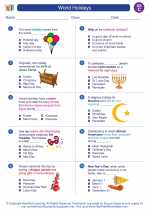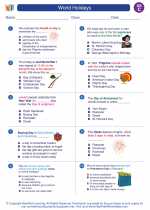Hinduism
Hinduism is one of the oldest religions in the world, with a rich history and diverse traditions. It is practiced by millions of people, primarily in India and Nepal, but also in many other parts of the world. Hinduism is a complex and varied religion, with a wide range of beliefs, practices, and rituals.
Key Beliefs
- Dharma: the moral and ethical duties of individuals
- Karma: the belief that actions have consequences, and that one's actions in this life will affect future lives
- Reincarnation: the belief in the cycle of birth, death, and rebirth
- Moksha: the ultimate goal of liberation from the cycle of reincarnation
- Polytheism: the belief in multiple deities, including Brahma, Vishnu, and Shiva
Sacred Texts
Hinduism has a rich collection of sacred texts, including the Vedas, the Upanishads, the Ramayana, and the Mahabharata. These texts contain myths, legends, and philosophical teachings that form the basis of Hindu beliefs and practices.
Practices and Rituals
- Puja: the act of worship, often involving offerings of food, flowers, and incense to deities
- Meditation and Yoga: practices aimed at spiritual growth and self-realization
- Temple Worship: visiting and making offerings at temples dedicated to various deities
- Festivals: such as Diwali, Holi, and Navaratri, which celebrate various deities and religious events
Study Guide
- What are the key beliefs of Hinduism?
- What are some of the sacred texts of Hinduism?
- What are some common practices and rituals in Hinduism?
- How does the concept of karma relate to the idea of reincarnation in Hinduism?
- What are some of the major festivals celebrated in Hinduism, and what do they commemorate?
Studying Hinduism can provide insight into the rich cultural and religious traditions of India, as well as a deeper understanding of the complexities of human spirituality.
.◂Social Studies Worksheets and Study Guides First Grade. Observance of Holidays
Worksheet/Answer key Thanksgiving Day
Thanksgiving Day  Worksheet/Answer key
Worksheet/Answer key HAPPY FATHER'S DAY
HAPPY FATHER'S DAY  Worksheet/Answer key
Worksheet/Answer key HAPPY FATHER'S DAY
HAPPY FATHER'S DAY  Worksheet/Answer key
Worksheet/Answer key Mother`s Day
Mother`s Day  Worksheet/Answer key
Worksheet/Answer key Mother`s Day
Mother`s Day  Worksheet/Answer key
Worksheet/Answer key World Holidays
World Holidays  Worksheet/Answer key
Worksheet/Answer key World Holidays
World Holidays  Worksheet/Answer key
Worksheet/Answer key World Holidays
World Holidays  Worksheet/Answer key
Worksheet/Answer key Mother's Day
Mother's Day  Worksheet/Answer key
Worksheet/Answer key Veterans Day
Veterans Day  Coloring Worksheet
Coloring Worksheet Vererans Day Color and Cut Activity
Vererans Day Color and Cut Activity 

 Worksheet/Answer key
Worksheet/Answer key
 Worksheet/Answer key
Worksheet/Answer key
 Worksheet/Answer key
Worksheet/Answer key
 Worksheet/Answer key
Worksheet/Answer key
 Worksheet/Answer key
Worksheet/Answer key
 Worksheet/Answer key
Worksheet/Answer key
 Worksheet/Answer key
Worksheet/Answer key
 Worksheet/Answer key
Worksheet/Answer key
 Worksheet/Answer key
Worksheet/Answer key
 Coloring Worksheet
Coloring Worksheet

The resources above cover the following skills:
Social Studies, Grade 1
History. The student understands the origins of customs, holidays, and celebrations. The student is expected to:
Compare the observance of holidays and celebrations, past and present.